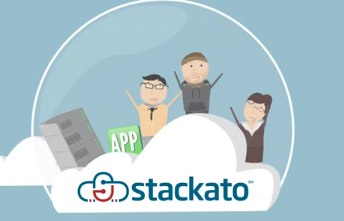Platform-as-a-Service (PaaS) provider ActiveState recently scored a sweet deal with HP: It is the official PaaS for the public HP cloud business.
ActiveState won the HP deal through the strength of Stackato, its PaaS that uses Cloud Foundry to offer a distributed developer platform. ActiveState executives say it hardened CloudFoundry for the enterprise. This means Stackato offers additional languages and provides more hypervisor and infrastructure support, as well as application lifecycle tools and monitoring capabilities.
Stackato is packaged as a virtual machine and can run both in a private data center and a public cloud environment. That’s the appeal to HP – Stackato has dual capabilities.
Stackato’s strength is that it was built with a “security first” approach, which makes it appealing to enterprise buyers. It supports multiple programming languages, enabling developers to push apps from their desktops to different cloud environments. That might mean a public cloud service, a hybrid one or a deployment that is entirely on-premise.
That gives Stackato the opportunity to leverage HP and its massive customer base. But therein also lies the problem. ActiveState could get ensnared in the roiling internal politics that are pitting HP’s traditional server business against its cloud strategy. The fissure is apparent in the recent departure of Zorawar Biri Singh, HP’s head of cloud computing. But it’s also connected to HP’s deep ties to the traditional enterprise hardware and software market where it makes the majority of its revenues.
HP is the global leader in x86 server sales, so the company faces a paradox: sell more servers and attract businesses to a public cloud service. A customer doessn’t need servers if it uses a public cloud environment. HP can get better margins if it sells into the traditional data-center market. These days, like a lot of companies, HP postions this as a private or managed cloud strategy.
But the bigger challenge for ActiveState may come with Cloud Foundry, the PaaS developed by VMware. It had once been promised as an open-source PaaS platform. Developers loved it. But there was always this question about VMware’s true intentions? Would it really support an open-source effort and foster a community?
Sacha Labourey, founder and CEO of PaaS provider CloudBees, said that when Cloud Foundry was released, he was extremely bullish, but then it made no sense after awhile. What was the real strategy? Cloud Foundry represented an open-source services play. But virtualization software made VMware a power in the enterprise. The company increasingly looked to that power base to establish a cloud strategy. Cloud Foundry seemed out of place.
Fast forward to December of last year and what does VMware do? It spins out Cloud Foundry, creating the Pivotal Group under the direction of Paul Maritz, EMC’s chief strategist.
Today, Cloud Foundry is a big question mark in the PaaS market. There are rumblings of a fork. AppFog, Tier3, and Uhuru all rely on it. Adopting a fork would mean a deep investment in engineering for the company that took that path.
But if any company can manage these waters, it’s ActiveState. Founded in 1997, the company is well-established as a provider of development tools for dynamic languages. It has the engineering resources to manage a Cloud Foundry fork if it chooses to do so.
In the meantime, the PaaS market is still quite nascent. HP may be able to leverage its vast customer base, but the customers using PaaS are very few.
Labourey says companies need to try a service like AWS and build a stack on it. Using AWS helps developers see the differences between services and software plays, and it will help them see that a PaaS can remove a lot of the complexity inherent in developing custom stacks.
Bart Copeland, president and CEO of ActiveState, says Stackato can provide speed and simplicity on-premise and in the cloud. The PaaS can provide the dual capability that companies seem more comfortable with using.
ActiveState will increasingly compete with Cloud Foundry while using its technology. How that competition plays out will depend a lot on ActiveState’s success with HP and the direction Cloud Foundry takes as part of the Pivotal Labs group.
